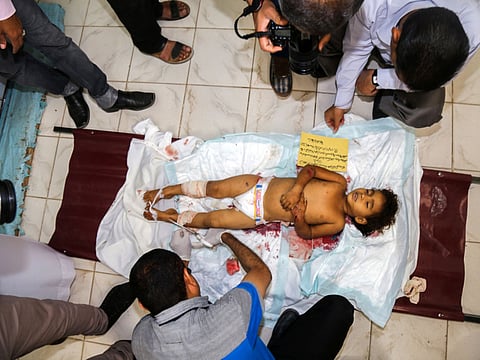Hospitals not spared from Yemen’s miserable war
Shocking report says over half of the poulation are food insecure, warns of famine

Dubai: Elderly Hamama Yousuf was rushed to the main hospital in one of Yemen’s largest cities after an artillery round lashed her chest with shrapnel, only to find that the doctors there had run out of the oxygen tanks needed to save her life.
In a video captured by local news station Yemen Youth TV, worried relatives carry her, still talking, to almost every clinic and hospital in the war-torn city of Taiz — none had any oxygen — until motionless and dead, she was finally taken to the morgue.
Once known as “Arabia Felix” or happy Arabia, Yemen has been disfigured by 10 months of war into one of the worst humanitarian crises in the world, where over half the population faces hunger and not even hospitals are spared.
The wounded and the dying find little comfort in Al Thawra hospital in the southwestern city of Taiz: Pressure from nearby shelling has blown out all the windows and several direct hits have reduced one ward nearly to dust.
“Our situation is disastrous in every possible way,” said Sadeq Shujaa, head of the local doctor’s union.
“Shelling hit the only cancer hospital and the children’s hospital, shutting them down. The war has sent doctors fleeing for their lives to the countryside and siege tactics mean we have to smuggle in medicine through mountain passes.” Taiz is contested between local militias and the armed Al Houthi militia which many residents say blocks aid from entering and bombs civilian targets. It is one of the worst fronts of the war, in which Yemeni forces ousted by Iran-backed Al Houthis in March are seeking to fight back to the capital Sanaa.
After the government fled into exile, a Saudi-led alliance of Arab states joined the war to restore it, recapturing the port city of Aden where President Abd Rabbo Mansour Hadi is now based.
Riyadh and its allies have launched hundreds of air strikes, sent in ground troops and set up a naval blockade to restrict goods reaching the country. The Saudis say Al Houthis are puppets of Iran.
Al Houthis have allied themselves with army units loyal to long-serving former president Ali Abdullah Saleh.
The fighting has killed around 6,000 people, about half of them civilians. Many times more are now in danger as a result of the humanitarian catastrophe wrought by the conflict.
The UN Food and Agricultural Organisation (FAO) warns of a “staggering” food crisis, saying famine looms as over half the population or some 14.4 million people are food insecure.
“The economy shrank by 35 per cent in 2015. People who used to have decent standards of living have become Yemen’s ‘new poor’ because with no electricity to power their business and no fuel to get anywhere, they have no way to earn money,” said Mohammad Al Assadi of Unicef.
“2.4 million people are internally displaced. In these conditions there’s no easy access to basic hygiene or healthcare, and now about 320,000 children under five years old are severely malnourished,” he added.
On the outskirts of Sana’a and in towns outside Taiz, clusters of shabby tent encampments housing thousands of families fleeing nearby violence have cropped up, where jobless parents idle and many children shrivel with hunger.
In peacetime, impoverished Yemen imported 90 per cent of its staple foods. Much of the 4 per cent of the arid country that is arable land now lies untilled because of the war.
“Besides the humanitarian catastrophes, a lack of jobs paves the way for a social and political crisis in which work skills erode and some people join the war effort to earn a living, feeding a cycle of violence,” said Salah Al Hajj Hassan of FAO.
As Yemeni society becomes increasingly militarised, combatants are often mixed among civilians. Rights group Human Rights Watch blamed Al Houthis for basing forces in a centre for the blind in the capital that was bombed on January 5.
The bomb did not explode, but rendered the facility unusable.
Days after the blast, a young boy with grey sightless eyes felt his way through the rubble and picked up a dead pigeon, in a moment captured by a local cameraman that has embodied for many Yemenis the sadness of the war.



